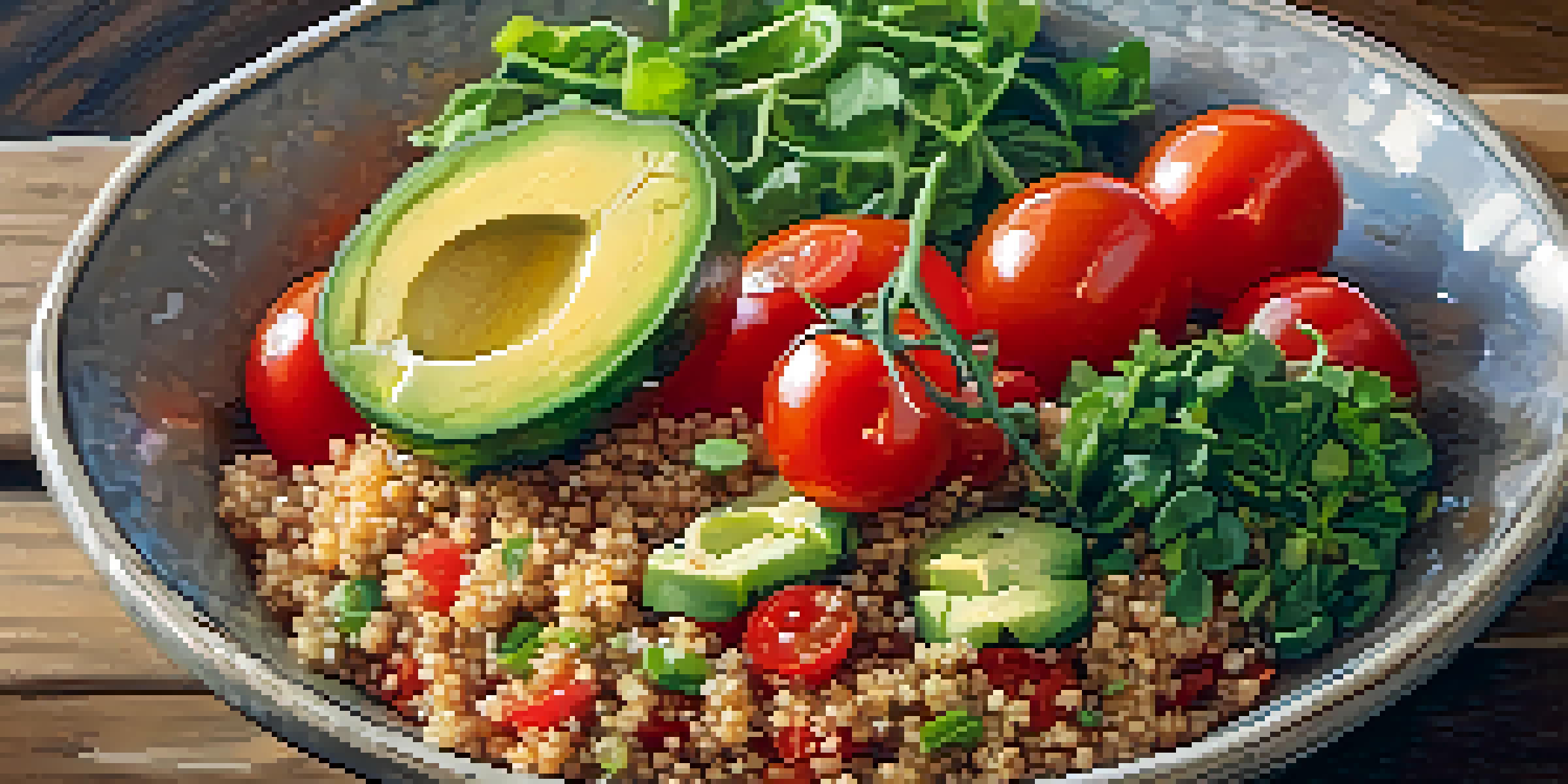Vegetarian Diets: A Cost-Effective Approach to Nutrition

Understanding the Basics of Vegetarian Diets
A vegetarian diet focuses on plant-based foods while excluding meat. This approach can range from strict veganism, which avoids all animal products, to lacto-vegetarianism, which includes dairy. Understanding these variations helps individuals choose the best diet for their lifestyle and health needs.
Let food be thy medicine and medicine be thy food.
Many people adopt vegetarian diets for various reasons, including health benefits, ethical concerns, or environmental impact. For instance, studies suggest that plant-based diets can lower the risk of heart disease and obesity. This makes vegetarianism an appealing option for those looking to improve their health while being mindful of the planet.
Moreover, a vegetarian diet doesn’t mean sacrificing flavor or satisfaction. With a plethora of grains, legumes, vegetables, fruits, nuts, and seeds available, the options are practically endless. This diversity can lead to exciting and nutritious meals that keep your palate engaged.
Cost Benefits of a Vegetarian Diet
One of the most significant advantages of a vegetarian diet is its cost-effectiveness. Generally, plant-based foods like beans, lentils, and grains are much cheaper than meat. By focusing on these staples, you can create satisfying meals without breaking the bank.

A budget-friendly vegetarian meal plan can include dishes like vegetable stir-fries, hearty soups, and grain bowls, all of which are not only affordable but also filling and nutritious. For example, a bean chili can serve multiple meals while being packed with protein and fiber.
Cost-Effective Plant-Based Eating
A vegetarian diet can save money by prioritizing affordable staples like beans, lentils, and seasonal produce.
Additionally, purchasing seasonal fruits and vegetables can further reduce costs, as they are often cheaper and fresher. This approach encourages a connection to local agriculture and can lead to discovering new, affordable ingredients that enhance your meals.
Nutritional Benefits of a Vegetarian Diet
Vegetarian diets are typically rich in essential nutrients, including fiber, vitamins, and antioxidants. Foods like fruits, vegetables, whole grains, and legumes are not only filling but also promote better digestive health. Emphasizing these foods can lead to a well-rounded, nutritious diet.
The diet that is good for the health of the planet is also good for our health.
Moreover, a plant-based diet can help maintain healthy weight levels and reduce the risk of chronic diseases. For instance, the high fiber content in vegetarian meals keeps you feeling full longer, which can aid in weight management. This aspect is particularly beneficial for those who struggle with portion control.
However, it's important to ensure you're getting enough protein and other vital nutrients, such as iron and vitamin B12. Incorporating a variety of foods, including legumes, nuts, and fortified products, can help meet these nutritional needs without the need for meat.
Easy Plant-Based Meal Ideas
Creating delicious vegetarian meals doesn't have to be complicated. Simple dishes like vegetable stir-fries, bean salads, and quinoa bowls can be prepared in under 30 minutes. These meals are not only time-efficient but also allow for creativity in the kitchen.
For instance, a quick chickpea salad with fresh vegetables and a drizzle of olive oil makes for a refreshing lunch. Alternatively, a hearty lentil soup can be made in bulk and stored for busy days, providing you with wholesome nutrition at a moment's notice.
Nutritional Advantages of Vegetarianism
Vegetarian diets are rich in essential nutrients, helping to manage weight and reduce the risk of chronic diseases.
Moreover, experimenting with spices and herbs can elevate your dishes, making them both tasty and satisfying. This ensures that your meals remain exciting and encourages a diverse intake of nutrients.
Shopping Smart for a Vegetarian Diet
When transitioning to a vegetarian diet, smart shopping can make a huge difference in your budget. Start by creating a meal plan and a shopping list before heading to the store. This practice helps you avoid impulse buys and stick to purchasing only what you need.
Buying in bulk is another effective strategy, especially for staples like rice, beans, and oats. These items typically have a long shelf life and can be used in a variety of recipes, maximizing your investment.
Additionally, consider looking for sales and utilizing local farmers' markets. These venues often offer fresh produce at lower prices, and buying seasonal items can help keep your meals both economical and delicious.
Overcoming Challenges of Vegetarian Eating
Transitioning to a vegetarian diet can come with its challenges, including cravings for meat or concerns about getting enough protein. However, many people find that with time, these cravings diminish as they discover satisfying plant-based alternatives.
Finding community support can also make the transition easier. Joining local vegetarian groups or online forums can provide motivation, recipe ideas, and encouragement. Sharing experiences with like-minded individuals can turn the journey into an enjoyable adventure.
Easy and Delicious Meal Ideas
Creating satisfying vegetarian meals can be quick and simple, allowing for creativity and diverse nutrition.
Lastly, be patient with yourself as you adapt to new eating habits. Gradually introducing vegetarian meals into your routine can help ease the transition and lead to a more sustainable lifestyle change.
Sustaining a Vegetarian Lifestyle Long-Term
To maintain a vegetarian diet long-term, it's crucial to stay informed and inspired. Continuing to seek out new recipes, cooking methods, and ingredients can keep your meals exciting and prevent boredom. Consider subscribing to food blogs or cookbooks that focus on vegetarian cuisine.
In addition, regularly revisiting your reasons for adopting a vegetarian diet can help reinforce your commitment. Whether it's for health, environmental, or ethical reasons, reminding yourself of these motivations can help you stay focused on your goals.

Lastly, don't hesitate to adjust your diet as needed. Life changes may require different approaches to your nutrition, and being flexible can help you maintain a balanced and enjoyable vegetarian lifestyle.